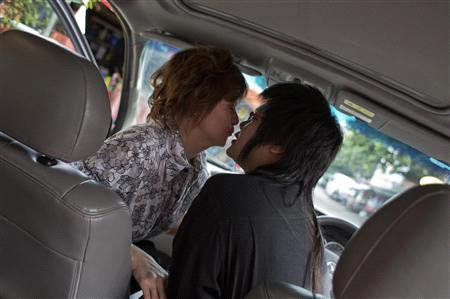Ammon News - BANGKOK (Reuters) - On a sweltering Saturday night in Bangkok's Patpong entertainment district, a group of men spill out of a neon-lit bar blasting dance music. Among them is Aashif Hassan and his long-term partner, both visitors from Malaysia.
"We're celebrating tonight. Where we're from, it's illegal to be gay. Here we feel liberated," said Hassan.
Known for its laissez-faire attitude, Thailand has positioned itself as a holiday destination for gay couples and could soon be cashing in on another niche market if a proposed law makes it the first Asian country to legalize gay marriage.
Other Southeast Asian countries such as Myanmar, Malaysia, Singapore and Brunei ban sexual relationships between men, but Thailand has become a regional haven for same-sex couples.
A civil partnership law in the works aims to give lesbian, gay, bisexual and transgender (LGBT) couples the same rights as heterosexuals. One lawmaker sees it passing by next year.
Same-sex unions are not currently recognized under Thai law, which defines marriage as between a man and a woman. That stops gay couples applying for joint bank loans or medical insurance.
In 2012, a group of lawmakers and LGBT activists formed a committee to draft legislation recognizing same-sex couples. But critics of the law say it will not give a level playing field because it raises the age of consent to 20 from 17 for homosexual couples. For heterosexuals it is 17.
Rights activists have another problem: the law would force transgenders to register their birth gender on their marriage certificate. Thai law makes it impossible for people to change their gender on a national identification document.
Beyond legal aspects, some wonder whether Thailand, quite conservative in many ways, is really ready to blaze this trail.
Homosexuality was decriminalized in 1956 but considered a mental illness as recently as 2002. Many Thai Buddhists believe homosexuality is a punishment for sins committed in a past life.
SUPERFICIAL ACCEPTANCE
In one notorious case in 2011, Nurisan Chedurame, 24, was found dead on her village rubbish dump with her head smashed in. Local media quoted police as saying her involvement with another woman was the reason she was murdered.
That same year, two women thought to have been in a sexual relationship were shot in a rice field outside Bangkok.
A worrying pattern of violent crimes prompted the International Gay and Lesbian Human Rights Commission to write to the Thai government in 2012 demanding that police stop dismissing gender-based violence as crimes of passion.
Anjana Suvarnanda, a co-founder of the Anjaree Group, an LGBT rights group, said violence towards lesbians was often blamed on the victims. Many turn to mainstream social networking sites like Facebook to air their grievances.
"Our inbox is overflowing with messages from women whose parents are pressuring them to marry men," said Anjana.
Thai film and television has no shortage of LGBT stars. But Prempreeda Pramoj Na Ayutthaya, a transgender rights activist and program officer at UNESCO, the United Nations' cultural agency, in Bangkok, said acceptance is often superficial.
"The entertainment industry accepts us with open arms because we poke fun at ourselves and make people laugh. But if we want to be taken seriously in a field like medicine we are not afforded the same courtesy," Prempreeda told Reuters.
Her friends will hesitate to back the draft bill, she said, because they do not want to be identified by their birth gender.
Wiratana Kalayasiri, an opposition lawmaker pushing the civil bill, said getting it on the agenda was tough as most members of parliament have conservative views on the issue.
"At first they bad-mouthed me and wondered if I would be struck by lightning for backing this," he said.
But many now see the merits of appealing to LGBT voters, he said, predicting the bill would pass in "less than a year".
Rights activist Anjana believes there is no time to waste.
When her friend collapsed and fell into a coma, it took hours for staff at a Bangkok hospital to attend to her.
"They insisted her husband sign the medical release form. Her partner is a woman, but the nurses refused to acknowledge this," said Anjana. "We urgently need the law to protect us. The rest, including less societal pressure, will follow."
